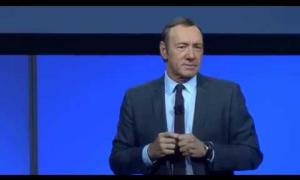How speechwriting changed me
October 29, 2014
"While I learned that other people are really just like me, that we all look for meaningful stories and that even my words can inspire others, speechwriting slowly humanized the world as I saw it."
On an October morning – three years ago, almost to the day – I entered a red-brick office building: a large, four-storey government building. It was a normal, cloudy day, Almost exactly like today. The office building wasn’t very special either: I had been working there for 5 years already.
Still, that morning was different from the countless mornings that had passed before. Without fully realizing what would happen, that morning I was embarking upon a journey that would change me. It was my first day as a speechwriter – a job that would change the way I look at myself, the people around me and the world. And this morning I want to tell you about that journey.
But before I do that I need to tell you about the years before that morning. Five years before that I had just graduated from university (Journalism School). I had entered university with dreams of becoming an excellent journalist. I wanted to offer truthful answers to the problems of our times. But instead of these answers I soon got stuck in doubt. A Journalist, of course, is supposed to work with doubt, questions and a with healthy suspicion of the world he sees around him. And that is good: we need that for checks and balances. But I took that a bit too serious. I ended up being suspicious of literally everything and believing in next to nothing. During these years I had met a lot of other journalists. Often they were cynical about life and the world. The problem with cynicism is that it’s very contagious. I ended up cynical as well; I didn’t know what to believe in anymore and what to pursue in life. When I graduated I had the degree, but I had no purpose.
Deep down I hated that. I didn’t want to spent my life telling others what not to believe. I wanted to dream. Soon enough I found a job in that red-brick office building I just told you about . It was good; I learned fine skills and it paid the bills. But I still searched for a purpose. So I tried three things, in pursuit of something to pursue.
First, I joined an organization for young volunteers helping people in need. It was an important cause and I met some inspiring people. And I actually felt quite good about myself. But after a year, the fire suddenly was extinguished. What all these young people did was invaluable, but I wanted too much out of it for myself. That didn’t work and I remained restless.
So I tried something else. I had always loved books and I thought reading like a maniac would do the trick. I decided to retreat into some parallel world of books. Don’t get me wrong: I loved it and I still do. But it didn’t exactly resolve anything and the restlessness remained.
Luckily, there was a third thing that easily followed reading: I started to write more. I took up short stories, believing that creating a great work of fiction would be an excellent purpose. Which, of course, it is. It went well: two of my short stories got published and a publisher encouraged me to write a novel. So I did. After more than two years of writing a first draft it took my publisher not even two hours to tell me I had a failed story. Dump it and start over, he told me. After some anger and denial I settled upon being a misunderstood artist. I believed I failed and I gave up literature.
Now this is not all. I’ve always been a bit timid when it comes to talking about the things I grapple with in life. I thought others would not understand or laugh at me. In short: I just feared a lot. And yet I’ve always admired people speaking with honesty about their fears, their hopes and their dreams. Deep inside I wanted to be just like them: honest, vulnerable and, in a way, fearless… I thought journalism, volunteering and writing would get me there. Which they didn’t. So, there I was, entering that office building on a cloudy October morning – three years ago. A slightly cynical twenty-eight year-old, searching for God knows what…
After that morning, something changed. As a fresh speechwriter I did what all of us do: I dove into the things I had to write about: opening a new road, announcing a new policy or praising some organization on their yearly conference. I talked to policy people, who buried me under an avalanche of facts, nuance and incomprehensible policy lingo. I also tried to pick my boss’ brain in the handful of minutes I was able to talk to her. And, then, I wrote. Then the policy people butchered every meaningful sentence and every form of rhythm I had carefully composed. And so it went until my boss approved the speech and went on stage to deliver it.
That – on itself – was unique at first: someone delivered words I had carefully crafted. And while I did all that – and all the other things speechwriters do: telling how about the job can be and how misunderstood wordsmiths generally are – I learned three important lessons.
First, I learned to see people differently. Because I soon discovered that most audiences are really eager to listen to a speech. Instead of what I thought, people are open to new ideas, to persuasion and to meaningful stories. And in turn, most speakers are looking to make a real connection with their audience. They want to use their speech to make something meaningful happen. Despite what I thought, most politicians are not as cynical as I was. And most people are not as wary of politicians as I was at the time.
Then, a second thing happened. I also got to know my boss a little bit better. Her habits and hobbies, the books she read and the films she watched. And I used that information in speeches. Sometimes it didn’t make sense at all – and some policy officer would hyperventilate. But when the argument was good and the story was fitting, the speeches turned out to be more successful. My boss really made a connection with the audience. It made me realize – more than I had ever before – to importance of stories. Although I was such a reader – and even a budding fiction writer – it never dawned on me that we all yearn for them, for some kind of direction, meaning and purpose in our life.
And with that, a third thing happened. When my boss spoke at a global conference on Water issues, we wrote a speech consisting of just three real stories: about an old lady from New York City, a mother from Indonesia and a young man from South Africa. We tied these stories together with a strong goal and a clear call to action. After she gave the speech my boss told me that she felt something happen in the room. She was a bit puzzled, but she liked it and clearly she wanted more of that. As well, reactions to the speech where the best I had ever experienced. I had not imagined that the words I helped write would have so much impact on other people. It was then that I fully realized why I loved to be a speechwriter: I just loved to help leaders lead – by improving their leadership-by-speech.
So while I learned that other people are really just like me, that we all look for meaningful stories and that even my words can inspire others, speechwriting slowly humanized the world as I saw it. It gave me an answer to the cynicism that had grown over time. I now realized that my view of the world had been upside-down and it was now back on its feet. I had rediscovered dreaming, and dreaming out loud.
So this is how speechwriting changed me. Yes, I still fear sometimes. But this craft made me dare to answer fear with more honesty, vulnerability and hope. I now dare to say that I want to change the world, one speech at a time. If a speech I write makes one person more hopeful instead of cynical, than I’ve been successful.
Of course I don’t write every speech with such high-minded feelings. There’s usually too many deadlines and battles over language with policy people. But I still remember that it is my job to make something happen in a speech. A spark of commonness between people, inspiration or action.
I know now that audiences look to us and our speaker for words of meaning. So we must always take our audiences seriously. And to do so, we also must find our speaker’s heartbeat. Because even the most boring, passionless technocrat has dreams about the world he wants to live in. And it is our job to let those dreams come to light, no matter how difficult the search.
And yes, all good speechwriting is very hard and can come scary close. Even if you write for someone else. But if you let that put you off, it will be much harder to write words that matter. So don’t be afraid if – along the way – the age-old craft of speechwriting sets you upon an unexpected adventure in your own life. If speechwriting can change me, it may happen to you as well. And, as a warning, it may also make you watch the drama series The West Wing over and over again, which drove my wife slightly crazy…
Fellow speechwriters,
if there is one thing that summarizes best all the things I’ve learned over the past three years, it is this: words matter more than we often imagine. If we do our work with great care, then human speech is at its most powerful. We shape ideas into words and stories, creating worlds in the hearts and minds of so many people.
It is not easy. The world is easily deafened by cheap opinions, quick anger and fear. And our daily work is one of too many deadlines, bad public speakers and Powerpoint. But when you see a speaker meet an audience just where they are… When that happens, it is – as the American writer Anne Lamott said – the sensation of unmerited grace.
We can make that happen: if the words we write for others – and those we speak ourselves – offer sincerity, honesty and vulnerability.
And we can make it happen if our words, as the Dutch poet Henriëtte Roland Holst wrote on the walls of this room (beside her husband’s murals), ‘…bear the hope in our hearts / that makes the dark world light’.





